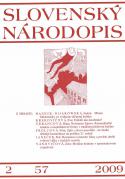Miesto folkloristiky vo výskume súčasnej kultúry
Position of Folklore within Contemporary Culture Studies
Author(s): Janina Hajduk-NijakowskaSubject(s): Anthropology
Published by: SAV - Slovenská akadémia vied - Ústav etnológie a sociálnej antropológie Slovenskej akadémie vied
Keywords: folkloristics; mass media; methodology; culture;
Summary/Abstract: Gradual disappearance of the traditional subject of folklore studies does not mean that this field of study is in crisis. The present times are very fascinating for the folklore studies. However, the subject of studies needs to be ”reformulated” and folklore needs to be considered an anthropological field of study. Within such an approach, orality can be understood not only as a way of being in the world (stories are used for taming reality) or as an oral method of cultural transmission, but also as a method of cognition (ontological orality). Orality interpreted in anthropological terms allows for the possibility to convey the message in oral (face to face), written (typographic) or electronic form (via the Internet). Electronic media are a constitutive feature of the contemporary cultural context, as they strongly influence transformations, which can be observed within folklore. Not only do they result in forming new interactions between people and media, but also direct interactions between people. Such a situation requires the process of watching television to be included in the subject of folklore studies; not only do TV programmes provide subject matter for conversations, but they also make these conversations easier and, first of all, help ”negotiate” the way of understanding the content. Currently, in the course of such interpretation (commenting, explaining) of events, folk thinking (mythologisation of reality, wishful character of judgments, stereotypical thinking) occurs. This type of thinking is 161 now the semantic frame for the perception of information passed on by the mass media. Folk thinking is also characterised by the so-called ”indistinguishability” – that is, such a moment within the contact of the recipient with the picture, in which the difference between what presents and what is presented disappears. The process of shaping the vision of the world is also very much affected by the isolation of consciousness, which value ideology above empiricism. The contemporary ”information community”, which put the abovementioned behaviour patterns into practice, can be best observed in the Internet, where community groups are naturally activated within the virtual reality. Therefore, the Internet, aided by other media, actively fulfils folklore-creating functions, while the Internet communication can be regarded as a substitute for an informal, oral story. The process of searching for folk elements in contemporary culture dignifies the anthropological folklore since using methods developed within this field to study contemporary mechanisms of understanding the world considerably enriches the knowledge about human beings.
Journal: Slovenský národopis
- Issue Year: 57/2009
- Issue No: 2
- Page Range: 149 - 161
- Page Count: 13
- Language: Slovak

